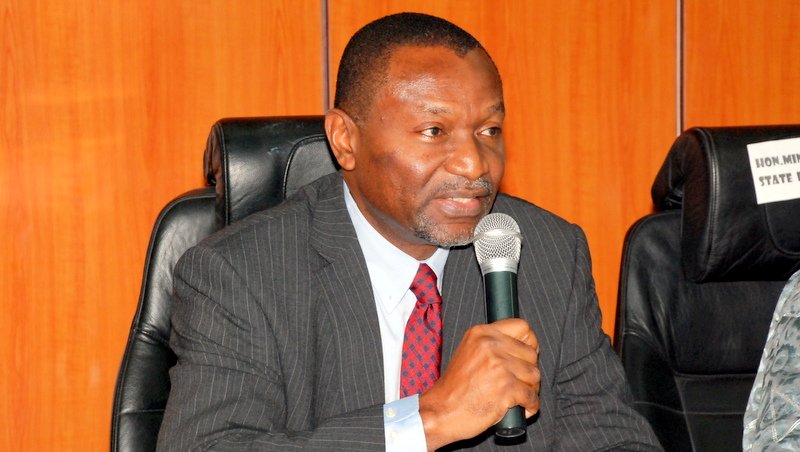- Udoma Explains Government’s Intensification of Oil Exploration
Nigeria’s Minister of Budget and National Planning, Senator Udoma Udo Udoma, at the weekend in Lagos said the federal government was aware of the diminishing long-term prospects of crude oil, explaining that this was why it was important to maximise the use and exploitation of the nation’s petroleum resources now.
Udoma stressed that this was also why the government was determined to move away from exporting raw crude oil and instead to encourage local refining and processing, as well as the local production of the various derivatives from crude oil for which there will continue to be domestic and international demand.
He spoke during an interactive session with civil society organisations and private sector players on the 2017 Medium Term Economic Framework (MTEF) and Fiscal Strategy Paper (FSP) and said the government was considering total oil production volume of 2.3 million barrels per day with an oil price benchmark of $45 per barrel for the 2018 budget.
He said the government was targeting revenue generation of N5.16 trillion for 2018 as against N5.08 trillion in 2017. The amount would be generated from oil revenue estimated at N2.1 trillion; non-oil revenue of N1.36 trillion; dividend from Nigeria Liquefied Natural Gas -N29.58 billion, and minerals and mining — N1.06 billion.
Others are independent revenue from agencies of government — N847.9 billion, domestic recoveries and fines — N364 billion, other federal government recoveries — N138.43 billion and grants and donor funding — N281.6 billion.
He said the budget would also be predicated on an exchange rate of N305/$ as well as 12.42 per cent inflation rate.
Other budget benchmarks which the minister stressed that might also be adjusted included nominal GDP of N133.97 trillion and N81.60 trillion nominal consumption.
He explained: “The MTEF outlines the federal government’s fiscal policies and our macroeconomic projections for the next three years from 2018 to 2020 and it provides the broad framework for the 2018 budget.
“In line with the goals of the Economic Recovery and Growth Plan (ERGP) 2017-2020, the medium term fiscal policies of government will be directed at achieving macroeconomic stability, accelerating growth, intensifying economic diversification and promoting inclusiveness.
“The need to look onwards to boost non-oil revenues cannot be overemphasised, as we diversify.
“We are on track to achieve full recovery and return firmly to the path of growth. Fiscal prudence must be observed at all levels of governance.”
He said the MTEF and FSP were drawn from the Economic Recovery and Growth Plan (ERGP) 2017-2020, which is the blueprint guiding all the economic plans of the government.
The ERGP, the minister stated, was itself the product of extensive consultations with a broad spectrum of Nigerians, including development experts, top economists and other critical stakeholders, adding that all budgets prepared within the planned period must be drawn from, and align with the provisions of the ERGP.
During the interactions, he explained the basis for the key assumptions and macroeconomic framework contained in the proposed MTEF, particularly the projections for oil production levels, crude oil price benchmark, exchange rate, inflation rate and GDP growth rate, among others.
These, Udoma noted, were all being exposed for consideration and discussion purposes, and welcomed comments and suggestions on them.
He said the consultations, which started penultimate Thursday with the governors, and continued last Tuesday and Thursday with the National Assembly, CSOs, private sectors operators (PSOs), the media and general public in Abuja, were for the purpose of seeking public input into the preparation of the MTEF as recommended by the provisions of the Fiscal Responsibility Act.
The minister explained that though government’s plan, as set out in the ERGP, is to diversify the economy as soon as possible away from reliance on crude oil proceeds, “we need the revenues from crude oil to fund the necessary infrastructure investments that are required to provide the enabling environment for the diversification of the economy into agriculture, manufacturing, construction and services”.
Udoma stated that the production level of 2.3 million barrels per day (mppd) projected for 2018 is realisable, adding that the country has the technical capacity to produce much more than that.
From available statistics from the Nigerian National Petroleum Corporation (NNPC), he stated that with the inclusion of current condensates production of 400,000 to 450,000 barrels a day, “we have been able to produce more than two million barrels a day at some periods this year”.
Addressing concerns raised over the level of borrowing and the continued provision for a deficit in the budget, the minister, while appreciating the concerns about the growing debt figures, explained that the issue was not so much about debt problem, but much more of a revenue problem.
According to him, even with the current levels of borrowing, the country’s fiscal deficit is still well within the three per cent threshold prescribed by the Fiscal Responsibility Act, adding that government was continuously monitoring the deficit level to ensure that it remains within the threshold.
The minister also admitted that it would be very challenging to achieve the target GDP growth rate of 4.8 per cent set out in the ERGP for 2018.
However, he emphasised that it could be achieved if the country is able to attract a high amount of private sector investment to drive economic growth.

 News3 weeks ago
News3 weeks ago
 Business3 weeks ago
Business3 weeks ago
 Technology3 weeks ago
Technology3 weeks ago
 Investment3 weeks ago
Investment3 weeks ago
 Banking Sector3 weeks ago
Banking Sector3 weeks ago
 Banking Sector3 weeks ago
Banking Sector3 weeks ago
 Appointments3 weeks ago
Appointments3 weeks ago
 Investment3 weeks ago
Investment3 weeks ago





























